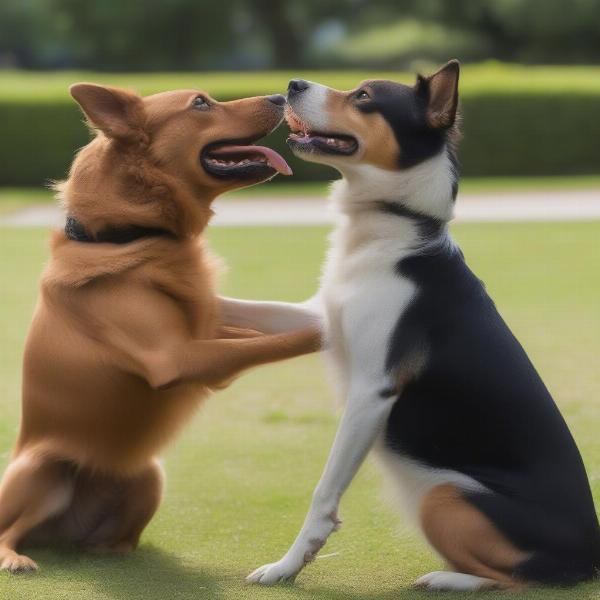Understanding why your dog barks at other dogs can be challenging. This behavior, while sometimes frustrating, is often rooted in normal canine communication and instinct. Whether your dog is displaying aggression, fear, excitement, or simply being territorial, it’s essential to understand the underlying cause to address it effectively. This article will explore the various reasons behind this common behavior and offer practical advice on how to manage and potentially modify it.
 Dog barking aggressively at another dog in the park
Dog barking aggressively at another dog in the park
Decoding the Bark: Understanding the Reasons
Dogs bark for a multitude of reasons, and when directed at other dogs, it can signal several different things. It’s crucial to observe your dog’s body language alongside the barking to accurately interpret the message. Is their tail wagging, body stiff, or ears pinned back? These subtle cues offer invaluable insights.
Territoriality: Guarding Their Turf
Dogs, like many animals, have a natural instinct to protect their territory. This territory could be their home, your car, or even the park they frequent. When another dog enters what they perceive as their space, barking serves as a warning to stay away.
Fear and Anxiety: A Defensive Mechanism
For some dogs, barking at other dogs stems from fear or anxiety. Past negative experiences, such as being attacked or bullied by another dog, can lead to a fear response. This barking is often accompanied by other signs of anxiety, like tucked tails, panting, and avoidance.
Frustration and Excitement: Just Wants to Play!
Sometimes, a dog’s bark is simply an expression of frustration or over-excitement. They may be eager to play with the other dog but unable to reach them, leading to a barrage of barks. This type of barking is often high-pitched and accompanied by playful body language, such as a wagging tail and playful bows.
Socialization Issues: Lack of Proper Introductions
Dogs that haven’t been properly socialized during their critical developmental period may struggle to interact appropriately with other dogs. This lack of social skills can manifest as barking, often out of fear, uncertainty, or misinterpretation of social cues.
Managing and Modifying the Behavior
Once you understand the underlying reason for your dog’s barking, you can begin to address it effectively. Here are some strategies to help manage and potentially modify the behavior:
- Positive Reinforcement Training: Reward your dog for calm behavior around other dogs. Start with a safe distance and gradually decrease the distance as your dog becomes more comfortable.
- Desensitization and Counterconditioning: Gradually expose your dog to other dogs at a distance where they don’t bark. Pair this exposure with positive experiences, such as treats or toys.
- Obedience Training: A well-trained dog is more likely to respond to your commands, even in the presence of other dogs. Focus on commands like “sit,” “stay,” and “leave it.”
- Socialization: If your dog lacks social skills, consider enrolling them in a supervised dog playgroup or seeking the guidance of a certified professional dog trainer.
- Managing the Environment: If your dog is territorial, avoid situations that trigger their barking. For example, if they bark at dogs passing by the window, close the blinds or curtains.
“Understanding the context of the barking is key,” says renowned canine behaviorist Dr. Emily Carter. “Look at the whole picture – body language, environment, and past experiences – to pinpoint the trigger and implement appropriate training strategies.”
Another expert, certified dog trainer, Mark Johnson, adds, “Consistency is crucial. Work with your dog regularly, and be patient. Modifying behavior takes time and dedication.”
Conclusion
While barking at other dogs is a common behavior, understanding the underlying cause is crucial for effective management. By observing your dog’s body language, understanding the various reasons for barking, and implementing appropriate training techniques, you can help your dog feel more comfortable and confident around other canines. Remember, patience and consistency are key to achieving positive results.
FAQ
- My dog barks at every dog we pass on walks. What should I do? Try redirecting their attention with a treat or toy before they start barking. Practice obedience training in a controlled environment and gradually introduce them to other dogs at a safe distance.
- Is it normal for my puppy to bark at other dogs? Yes, puppies often bark at other dogs out of excitement, curiosity, or fear. Early socialization is essential to help them learn appropriate social skills.
- My dog is aggressive towards other dogs. Can training help? Yes, professional training can help manage and modify aggressive behavior. Consult with a certified professional dog trainer or veterinary behaviorist for guidance.
- My dog is afraid of other dogs. How can I help them overcome their fear? Desensitization and counterconditioning can be effective in helping fearful dogs. Start with a safe distance and gradually expose them to other dogs, pairing the exposure with positive experiences.
- Why does my dog only bark at certain types of dogs? They may have had a negative experience with a similar looking dog or breed in the past, which may cause them to react fearfully or aggressively.
dog barking at other dogs
barking of the dog
sausage dog cafe
dog rescue swindon
ILM Dog is your one-stop resource for expert advice on dog care, encompassing breed selection, health, training, nutrition, and more. We provide comprehensive guidance to help you nurture your canine companion throughout their life. For personalized advice, reach out to our team of experts via email at [email protected] or call us at +44 20-3965-8624. ILM Dog offers top-tier products and services to ensure your dog’s well-being.